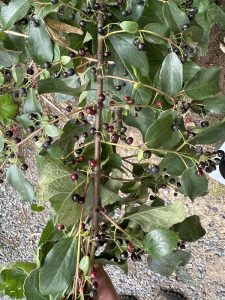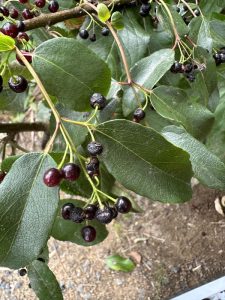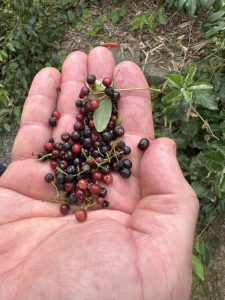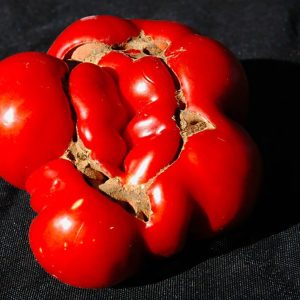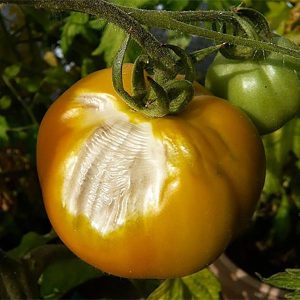Thanks to the people who have contributed to this week’s newsletter: Chris Chapple, Hayden Marks, Jaimie Sweetman, Kate Woodstock, Kerri Wellington, Lynn Wallace and Marcela Santos.
Maqui berry (Aristotelia chilensis) by Jaimie Sweetman
[Jaimie Sweetman is Head Gardener of the Edible Forest located on the Yarra Valley Estate in Dixons Creek. Tours of the Edible Forest, often led by Jaimie, take place on Fridays and Saturdays – read more and book your place on a future tour.]
The maqui berry, or Chilean wineberry (Aristotelia chilensis), is one of the unassuming plants in our edible forest due to its small berries and the fact that it’s not well known in Australia. It originates from South America.
The plant is a small tree (up to 4 metres) which grows well in full sun amongst other plants. It apparently won’t tolerate a high frost but it does well in our forest even with some frost.
The berries are so small that they do take a bit to harvest but they apparently have more antioxidants than blueberries, which makes it worth it. They taste almost eucalyptus-like to me (Wikipedia says that they taste like blackberries). They can be eaten fresh, ground up and used as a spice, or used as a super food powder.
Over time I am becoming more in love with this special plant. I highly recommend it if you can find a seedling to buy. Unfortunately one of ours blew over in the wind and this is why planting two and having cuttings available is always worth it when a plant may not be easily sourced.
Read more of Jaimie’s unusual edible plants on our website.
Midyim berry (Austromyrtus dulcis) by Melbourne Bushfood
[The material below is a summary of material from the Melbourne Bushfood website. Melbourne Bushfood sells a wide range of bush foods (both the foods themselves and the plants) which you can buy either online or at their shop at 49 Sparks Avenue, Fairfield, Wednesday to Sunday, 10am-4pm.]
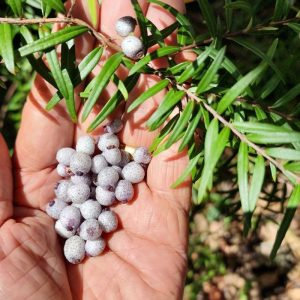 The midyim berry has numerous, small, sweet berries which are best eat raw. They are one of the tastiest native fruits, with a touch of eucalypt and spice. The berries appear in late autumn.
The midyim berry has numerous, small, sweet berries which are best eat raw. They are one of the tastiest native fruits, with a touch of eucalypt and spice. The berries appear in late autumn.
The plant grows to around 50cm in both height and width. Grow in full sun (or part-shade with less fruiting). Suitable for growing in pots.
One plant can yield over 1kg of berries with correct care, with correct watering, fertilising and pruning key to a large bounty. They are generally drought tolerant but can experience problems with overwatering so water only when the soil becomes dry, and make sure the soil is well-draining. Fertilise with a native fertiliser immediately after harvesting and regularly spray with a seaweed solution. Trim lightly after harvesting to keep the plant bushy and well maintained.
Read about more bushfoods on our website.
Angelo Eliades’ articles
Lynn Wallace has written in.
“I do like Angelo’s articles. So science based and practical. Thank you, Angelo.”
[Editor: I agree, which is why I highlight all of his new articles plus index his previous articles on our website.]
“In last week’s newsletter, Angelo’s article about spent coffee grounds included a link to a previous article that he wrote about worm farms, which I also read.
“As I live on a property with 100% tank/rain water, it has never occurred to me that town tap water would be unsuitable for worm farms. Not everyone can produce lovely pure rainwater for themselves, let alone their worms. Maybe a trick that a friend used whilst stationed in New Delhi might help. The potable water there was treated quite heavily, with chlorine levels quite high. To remedy this, residents filled green or brown wine or beer bottles with the treated water. Left in the sun for a day, the chemicals evaporated (maybe Angelo knows the science!) and the water was sweet. Surprisingly, the water tasted a bit different depending on what colour the bottle was. I have since used this method in my home when living in a city with treated water. I stopper the bottles or not, depending on likelihood of debris getting in. Easy enough to do and problem solved, hopefully.
“ps. Angelo’s fruit fly traps are working a treat in my orchard. Several seasons of bad infestations have been followed by two seasons of lovely clean fruit and fruit flies (plus other nasties) in the traps. Both economical and effective.”
Powerhouse Cheese is no more
Following last week’s guide to local cheese, I have just found out that one of the cheesemakers listed – Powerhouse Cheese – is no more. That’s a great pity as they were, with their stinky cheeses, probably the most unique of the local cheesemakers. Thanks for the heads up, Chris Chapple!
Carlton Neighbourhood Learning Centre’s compost hub
During 2023, they processed 36,000Kg of food waste in their compost hub. Watch this video about the person who cycles round collecting the food waste. Read more about their compost hub.
Catfacing and sunscald tomatoes
The Kevin Heinze GROW garden has reported that they have had both catfacing and sunscald tomatoes this year – see the left hand and right hand photos below respectively.
They think that catfacing tomatoes are edible but that sunscald ones are not. From a brief Google search, the internet appears to think that both are edible.
Catfacing can happen when something goes wrong in either flower formation or pollination (read more on Wikipedia). Sunscalding can happen when the fruit is exposed to too much sun (read more on Wikipedia).
A new seed library at Bundoora Park
There is a new seed library at Bundoora Park Community Garden, Bundoora Park, 1069 Plenty Road, Bundoora. Read more on the Darebin Food Harvest Network website.
This is the 6th seed library in Darebin and the 19th that I am aware of in North East Melbourne. See the map on our website. If you know of any others, drop me a line.
All the seed libraries operate on a similar philosophy, namely:
- Take – visit a seed library and take the seeds you would like to grow.
- Grow – grow the seeds at home, but leave at least one plant to go to seed.
- Save – save some seeds for next year from the healthiest plants.
- Share – return some of the saved seeds to the seed library.
Renown Street Community Orchard
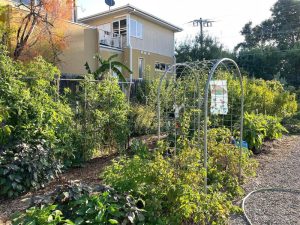 Renown Street Community Orchard, in Coburg North, was first established in 2018 and comprises numerous fruit trees plus some spots for annual veggies and plenty of herbs and flowers. Over the years, they have transformed the space from an unloved patch of weedy grass to a thriving, productive organic garden where a community of gardeners of diverse backgrounds and skill levels can learn and grow together.
Renown Street Community Orchard, in Coburg North, was first established in 2018 and comprises numerous fruit trees plus some spots for annual veggies and plenty of herbs and flowers. Over the years, they have transformed the space from an unloved patch of weedy grass to a thriving, productive organic garden where a community of gardeners of diverse backgrounds and skill levels can learn and grow together.
The orchard sits on a parcel of Melbourne Water-owned land on Wurundjeri country, with the piped Merlynston Creek flowing underneath.
The orchard is open to the public and they are always looking for more people to join their orchard community, with the aim that lots of people will feel a sense of shared ownership of the orchard and feel comfortable to go along to do some gardening whenever they feel the desire. They have working bees from time to time, as publicised on their Facebook page.
Welcome Drew and colleagues!
13 community gardens in Merri-Bek now have pages on our website.
The Melbourne ‘Local Food Connections’ community radio show
On next Sunday’s show (28th January), Ann Stanley will interview Louise Ward about global gardens of peace. Listen on 3CR (855 AM), 10-10.30am, by tuning into either the station (855 AM) or its livestream.
Podcasts of all previous episodes are available on their website.
Which link was clicked most times in the last newsletter?
The most popular link in the last newsletter was Angelo’s article about whether or not coffee grounds can be used as a fertiliser in the garden.
 Joke (or pun) of the week
Joke (or pun) of the week
What do you get if you divide a pumpkin’s circumference by its diameter? Pumpkin pie.
Regular activities over the coming week
If you are planning to go to a food swap or community garden over the next week, it would be prudent to check with them first that the event is actually happening because some of the regular activities don’t actually take place during January.
Farmers’ and other food markets
- Friday: Farm Raiser farmgate (Bellfield) and Community Grocer, Carlton.
- Saturday: Carlton, Coburg and Farm Raiser farmgate (Bellfield).
- Sunday: Alphington and Eltham.
- Tuesday: Community Grocer, Fitzroy.
Food swaps
- Saturday: Blackburn, Brunswick East, Heidelberg, Hurstbridge and Preston/Thornbury,
- Sunday: Eltham.
Community gardens
- Thursday: Buna (Heidelberg West), Diamond Valley Library (Greensborough), Edible Hub (Hurstbridge), Fawkner Food Bowls – children (need tickets), SEEDs (Brunswick) and Whittlesea.
- Friday: West Brunswick.
- Saturday: Links (Lalor), Macleod and Thrive (Diamond Creek).
- Sunday: Creeds Farm (Epping), Fawkner Food Bowls, Merri Corner (Brunswick East), Pentridge (Coburg), Regent (Reservoir) and West Brunswick.
- Monday: Panton Hill, SEEDs (Brunswick) and Whittlesea.
- Tuesday: Watsonia.
- Next Wednesday: Eltham Neighbourhood House, Macleod, Newton Street (Reservoir), Span (Thornbury) and Sylvester Hive (Preston) .
Upcoming face-to-face events – not cooking
Introduction to meadmaking (3 sessions); Saturdays 10th February (9am-midday), 24th February (10am-midday) and 9th March (10am-midday); $50; Eltham.
The cost of $50 includes membership of the guild until July 2024. You will also need to pay for the cost of your ingredients and utensils (expected to total around $65). Mead is the world’s oldest alcoholic beverage and uses honey as the primary fermentable sugar. This course will explore how to brew modern meads. Over the 3 sessions, you will be guided through the process and make your first mead. More specifically: the first session will cover learning about mead; the second, monitoring the ferment and potential problems; and the third, racking, tasting, finalising and bottling. Organised by Eltham & District Winemakers Guild.
Wicking pots and sun stress protection; Friday, 16th February, 9.30-10.30am; free; Princes Hill.
Yarra City Council’s Urban Agriculture team will demonstrate the construction of wicking pots (self-watering pots) and provide simple tips to minimise heat and sun stress through planning and maintaining your growing space, whether it be on a balcony, courtyard or something larger. Organised by My Smart Garden.
Community food aid festival; Sunday, 25th February, 11am-3pm; free; Edendale.
There will be some information stalls where you can learn about some of the local food aid organisations plus issues of food insecurity and food waste. They will be launching their Creative community cookbook – fighting waste and fighting hunger. There will also be food, music and activities for children (such as face painting). Organised by Diamond Valley Community Support.
Whittlesea Garden Expo; Saturday, 2nd March and Sunday, 3rd March, both 9am-3pm; $8; Whittlesea.
Guest speakers: Chloe Thomson and Melissa King. Around 40 stalls, including plants, flowers, pots, garden tools, garden design and garden art. Food, music and drinks.
Grow your veggie garden; Saturday, 16th March, 10-11am; $25 ($25 per hour); Kinglake.
Do you know how to prepare and get the best from your garden? Unsure what to plant and when? Go along learn what to do with the land you have, how to best prepare the area and the soil, and what to plant and how. Organised by Kinglake Ranges Neighbourhood House.
Edible weeds; Saturday, 16th March, 10am-midday; $70 ($35 per hour); CERES.
Learn about the seasonal edible weeds that thrive in Melbourne’s inner north and gain knowledge about the plants’ culinary, medicinal and ecological uses. This session will also include a demonstration, and sampling, of prepared edible weeds. Presenter: Lauren Mueller.
Growing nutrient dense food; Saturday, 16th March, 10am-3pm; $145 ($29 per hour); CERES.
This workshop will introduce you to growing better quality, nutrient rich produce at home even if you only have a tiny growing space. It will include: selecting your crops; transforming your soil by focusing on the soil food web; an introduction to soil minerals and going beyond NPK; creating nutrient rich composts; fertilising your plants for maximum nutrition; and harvesting and preparing produce to maintain nutrients. Presenter: Donna Livermore.
Jenny’s garden open garden; Saturday, 16th March and Sunday, 17th March, both 10am-4.30pm; $10; Canterbury.
There is a mini orchard, including a quince, a pear, a lemon and several apple trees. There is also a bed of raspberries and a large potager garden, replete with tomatoes, rhubarb, asparagus, culinary herbs and other seasonal crops. Organised by Open Gardens Victoria.
The Herb and Chilli Festival; Saturday, 16th March and Sunday, 17th March, both 10am-5pm; $27; Wandin.
This festival will celebrate all things related to herbs and chillies. There will be stalls, demonstrations, talks, tastings, music and dance. There will be around 80 exhibitors.
Setting up a worm farm; Saturday, 16th March, 2-3.30pm; free; Edendale.
Learn how to set up a worm farm and the easiest methods to manage and care for these most hard-working of creatures. This workshop will cover both the theory and practice of worm farming in a household setting. It will be useful for those wishing to recycle household food waste in order to produce worm products for use in the improvement of soil in gardens and pot plants. Discounted worm farms will be available for sale on the day.
Local Sustainability Fair (Ringwood); Sunday, 17th March, 10am-2pm; free; Ringwood.
This will be a sustainably focused community family event incorporating information stands, crafters, food vendors, children’s activities, guest speakers, performers and many vendors selling sustainable products. Organised by Central Ringwood Community Centre
In January
- Basic inoculation workshop; Saturday, 27th January, 2-4pm; $87 ($44 per hour); Alphington.
- Introduction to food photography; Sunday, 28th January, 9.30am-12.30pm; $119 ($40 per hour); Warrandyte.
In February
- The herbal apprentice (8 sessions); starting Friday, 2nd February, 10am-3pm; $995 ($21 per hour); CERES.
- Summer fruit tree pruning; Saturday, 3rd February, 9am-1pm; $65 ($19 per hour); Edendale.
- Composting and mini market; Saturday, 3rd February, 10.30am-12.30pm; free; Montrose.
- Urban wine walk; Saturday, 3rd February, midday-4pm; $82; Richmond.
- In-depth mushroom cultivation workshop; Sunday, 4th February, 10am-4pm; $149 ($25 per hour); Alphington.
- The Haven open garden; Sunday, 4th February, 10am-4.30pm; $10; Mooroolbark.
- The aussie veggie patch open garden; Sunday, 4th February, 10am-4.30pm; $10; Mooroolbark.
- Buttenshaw Farm open garden; Sunday, 4th February, 10am-4.30pm; $10; Montrose.
- Foraging course (5 sessions); Tuesday, 6th February, 6-7.30pm; $339 ($45 per hour); Coburg.
- Beginners beekeeping course (5 sessions); on Wednesdays, starting 7th February, 7-9pm; $255 ($26 per hour); Kinglake.
- Summer vegetables illustration (4 sessions); consecutive Thursdays, starting 8th February, 10am-midday; $144 ($18 per hour); Forest Hill.
- Permaculture Design Course (100 hours); Saturday, 10th February, 9am-4.30pm; $2,350 ($24 per hour); CERES.
- Introduction to meadmaking (3 sessions); Saturdays 10th February (9am-midday), 24th February (10am-midday) and 9th March (10am-midday); $50; Eltham.
- Urban foraging 101; Saturday, 10th February, 10am-12.30pm; $90 ($36 per hour); Forest Hill.
- Small space gardening; Saturday, 10th February, 10am-3pm; $115 ($23 per hour); CERES.
- Urban foraging 101; Sunday, 11th February, 10am-12.30pm; $90 ($36 per hour); Forest Hill.
- Beginners backyard beekeeping; Sunday, 11th February, 10am-3pm; $220 ($44 per hour); CERES.
- Traditional wooden spoon carving; Sunday, 11th February, 10am-4pm; $145 ($29 per hour); CERES.
- Introduction to permaculture (4 sessions); on consecutive Mondays starting 12th February, 10am-2.30pm; $60 ($3 per hour); Edendale.
- Introduction to horticulture and permaculture (15 sessions); starting Wednesday, 14th February, 10am-3pm; $1,050 ($14 per hour); CERES.
- Get buzzy with Ben’s beeswax wrap workshop; Wednesday, 14th February, 12.30-2.30pm; free; Bayswater North.
- Complete urban farmer (14 sessions); starting Thursday, 15th February, 9am-3pm; $1,150 ($14 per hour); CERES.
- Wicking pots and sun stress protection; Friday, 16th February, 9.30-10.30am; free; Princes Hill.
- Urban wine walk; Saturday, 17th February, midday-4pm; $82; Collingwood.
- North Fitzroy urban agriculture walk; Wednesday, 21st February, 10.30am-midday; free; Fitzroy North.
- Urban farm excursion; Friday, 23rd February, 11am-1pm; free; Greensborough.
- Mushrooms growing; Sunday, 25th February, 10am-4pm; $195 ($33 per hour); CERES.
- Community food aid festival; Sunday, 25th February, 11am-3pm; free; Edendale.
- Wangim cups; Tuesday, 27th February, 6.30-7.30pm; free; Reservoir.
- Complete urban farmer (14 sessions); starting Wednesday, 28th February, 9am-3pm; $1,150 ($14 per hour); CERES.
In March
- Whittlesea Garden Expo; Saturday, 2nd March, 9am-3pm; $8; Whittlesea.
- Introduction to beekeeping (2 sessions); Saturday, 2nd March, 9.30am-4.30pm and Saturday, 9th March, 10.30am-12.30pm; $225 ($24 per hour); Blackburn North.
- Urban foraging 101; Saturday, 2nd March, 10am-12.30pm; $90 ($36 per hour); Forest Hill.
- Organic gardening for beginners (2 sessions); Saturday 2nd and Sunday 3rd of March, 10am-2.30pm; $85 ($9 per hour); Richmond.
- Companion planting and mini market; Saturday, 2nd March, 10.30am-12.30pm; free; Montrose.
- The Prosecco Festival; Saturday, 2nd March, 11am-10.30pm; $70; Abbotsford.
- Potato fest; Saturday, 2nd March, 4-7pm; free; Bellfield.
- Whittlesea Garden Expo; Sunday, 3rd March, 9am-3pm; $8; Whittlesea.
- Food waste solutions – Bev Middleton; Sunday, 3rd March, 12.30-1.45pm; free; Edendale.
- Summer vegetables illustration (4 sessions); consecutive Thursdays, starting 7th March, 10am-midday; $144 ($18 per hour); Forest Hill.
Regular events
- Beekeeping workshop; roughly once a month on Saturdays, 1-4pm; $95 ($32 per hour); Brunswick East.
- Carlton aperitvio food tour; every Friday, 5-7pm; $139 ($70 per hour); Carlton.
- Cocktail making classes; various dates, times and costs; Richmond.
- Edible Forest tours; every Friday and Saturday, 11am-1pm and again at 1-3pm; $25 ($13 per hour); Dixons Creek.
- Eltham trails (walking food tour); various Saturday mornings and Thursday evenings; $65 ($22 per hour); Eltham.
- Flavours of Coburg food tour; 3rd Saturday of each month, 10am-1pm; $65 ($22 per hour); Coburg.
- Gin making masterclass; most Saturdays, 10am-1pm; $175 ($58 per hour); Nunawading.
- Plant to harvest; 1st Saturday of the month, midday-1pm; $5; Macleod.
- Gin masterclass; most Saturdays and Sundays, midday-1pm; $80 ($80 per hour); Eltham.
- Ratio Cocoa Roasters behind the scenes chocolate factory tour; various Fridays and Saturdays; $20 ($14 per hour); Brunswick.
- Spoon carving workshop; various Saturdays and Sundays, 10am-1pm; $130 ($43 per hour); Coburg North.
- Truffle workshop at Ratio Cocoa Roasters; 3rd Sunday of each month, 11am-1pm; $75 ($38 per hour); Brunswick.
- Wine tasting; various Saturdays and Sundays; $130; Fitzroy.
- Wine tasting; various Saturdays, 3-5pm; various prices; Northcote.
Upcoming face-to-face events – cooking
Buns and beer – cooking workshop at Molly Rose; Wednesday, 21st February, 6-8.30pm; $168 ($67 per hour); Collingwood.
Learn how to make a Taiwanese pepper bun. With a Molly Rose drink in hand, learn how to laminate a flaky Chinese-style dough, mix a pork filling, and fold and cook the buns. Presenter: Cristina Chang.
FFS … ferment four staples; Sunday, 25th February, 11.30am-4.30pm; $425 ($85 per hour); Fitzroy North.
This is a fermenting ‘101’ class, where you will learn about salt, different preserving techniques, two of the most popular cabbage recipes (kraut and kimchi), a drink (kvass) and all about SCOBYs, with a focus on milk kefir. At the end, you will sit down for a chat and a bite to eat, including fermented foods and drinks to taste. You will take home everything you make during the class: kimchi, sauerkraut, milk kefir butter, milk kefir with SCOBY, whey soda and kvass.
German easter baking with Claudia Loeber-Rab; Saturday, 16th March, 10am-1.30pm; $80 ($23 per hour); Camberwell.
Dive into the rich traditions of German baking, crafting Easter egg nests and intricately braided Easter bread. Presenter: Claudia Loeber-Rab. Organised by Camberwell Community Centre.
Tomato passata making workshop; Sunday, 17th March, 10-1pm; $10; Watsonia.
You will learn how to process tomatoes, sterilise jars/bottles and how to seal them. You will then have a pasta lunch. Take along some glass jars with lids (if you have some). Organised by Watsonia Neighbourhood House.
Thai chicken larb salad; Tuesday, 19th March, 10-11.30am; $28 ($19 per hour); Doncaster East.
Thai chicken larb salad is a celebration of fresh flavours and textures – the perfect balance of sweet, savoury, sour and spiciness with aromatic herbs and the fresh crunch from lettuce. Organised by Pines Learning.
In January
- Cook Indian by the creek; Wednesday, 24th January, 6.30-8pm; $55 ($38 per hour); Diamond Creek.
- Feta, halloumi and mascarpone with Kristen Allan; Saturday, 27th January, 10am-4pm; $345 ($58 per hour); Fitzroy North.
- Japanese fermentation; Wednesday, 31st January, 6.30-9pm; $120 ($48 per hour); Collingwood.
In February
- Milk kefir magic; Thursday, 1st February, 6.30-8.30pm; $145 ($73 per hour); Fitzroy North.
- No waste cook club 18-25 years (4 sessions); on Fridays, starting 2nd February, 11am-2pm; $107 ($27 per hour); Coburg.
- Sourdough bread baking; Saturday, 3rd February, 9am-5pm; $220 ($28 per hour); CERES.
- Pasta making class with Piera; Saturday, 3rd February, 10am-1pm; $140 ($47 per hour); Thomastown.
- Jam making workshop with Rie’s Kitchen; Saturday, 3rd February, 10.30am-midday; free; Whittlesea.
- Jam making workshop with Rie’s Kitchen; Saturday, 3rd February, 2.30-4pm; free; Lalor.
- Summertime salads – Vietnamese classics; Sunday, 4th February, 10am-2pm; $190 ($48 per hour); Panton Hill.
- Food for mind and gut; Sunday, 4th February, 10am-2.30pm; $150 ($33 per hour); CERES.
- Cooking for one (5 sessions); on 5 consecutive Thursdays, starting 8th February, 11am-1pm; $50 ($5 per hour); Lilydale.
- Healthy cooking for adults (6 sessions); on Fridays, starting 9th February, 10am-midday; $55 ($5 per hour); Kilsyth.
- Blokes in the kitchen (2 sessions); on Fridays, 9th February and 8th March, each 9am-midday; $90 ($15 per hour); Surrey Hills.
- Mozzarella making class; Saturday, 10th February, 10am-midday; $150 ($75 per hour); Thomastown.
- Mozzarella, burrata and stracciatella with Kristen Allan; Saturday, 10th February, 11am-4pm; $345 ($69 per hour); Fitzroy North.
- Mozzarella, burrata and stracciatella cheese making; Sunday, 11th February, 10am-3pm; $240 ($48 per hour); CERES.
- Cupcake decorating workshop; Sunday, 11th February, 11am-1pm; $130 ($65 per hour); Bayswater North.
- Cupcake decorating workshop; Sunday, 11th February, 2-4pm; $130 ($65 per hour); Bayswater North.
- Vegan chocolate making; Wednesday, 14th February, 6.30-8pm; $80 ($53 per hour); Collingwood.
- Yes chef! Cooking for preschoolers (4 sessions); on 4 consecutive Thursdays, starting 15th February, 2-3pm; $136 ($34 per hour); Coburg North.
- Bubble tea making workshop; Friday, 16th February, 3-4pm; free; Bundoora.
- Croquembouche workshop; Saturday, 17th February, 1.30-5.30pm; $137 ($34 per hour); Lower Templestowe.
- Vegan cheese making; Sunday, 18th February, 10am-3pm; $150 ($30 per hour); CERES.
- Kombucha, jun, water kefir, wild mead and beet kvass; Sunday, 18th February, 10.30am-12.30pm; $180 ($90 per hour); Fitzroy North.
- Buns and beer – cooking workshop at Molly Rose; Wednesday, 21st February, 6-8.30pm; $168 ($67 per hour); Collingwood.
- Yusheng and dumplings; Saturday, 24th February, 11am-1pm; $28 ($14 per hour); Forest Hill.
- Zero waste cooking workshop; Sunday, 25th February, 10am-1pm; $25 ($8 per hour); Brunswick.
- Thai BBC classics; Sunday, 25th February, 10am-2pm; $190 ($48 per hour); Panton Hill.
- Mexican cooking; Sunday, 25th February, 10am-3pm; $150 ($30 per hour); CERES.
- FFS … ferment four staples; Sunday, 25th February, 11.30am-4.30pm; $425 ($85 per hour); Fitzroy North.
In March
- No waste cook club 18-25 years (4 sessions); on Fridays, starting 1st March, 11am-2pm; $107 ($27 per hour); Coburg.
- Gnocchi making class; Saturday, 2nd March, 10am-1pm; $140 ($47 per hour); Thomastown.
- Fermenting at home; Saturday, 2nd March, 10am-1pm; $120 ($40 per hour); CERES.
- Macarons workshop; Saturday, 2nd March, 2-4pm; $102 ($51 per hour); Lower Templestowe.
- Sourdough bread baking; Sunday, 3rd March, 9am-5pm; $220 ($28 per hour); CERES.
- Sri Lankan cooking class; Monday, 4th March, 6-8.30pm; $90 ($36 per hour); Surrey Hills.
- Sourdough basics; Wednesday, 6th March, 6.30-8.30pm; $120 ($60 per hour); Collingwood.
- Japanese cooking 101: Chika’s Japanese home cooking (3 sessions); on 3 consecutive Fridays, starting 8th March, 1-2pm.; $80 ($27 per hour); Greensborough.
- Goat – soft cheeses with Kristen Allan; Saturday, 9th March, 11am-4pm; $345 ($69 per hour); Fitzroy North.
- Sri Lankan Banquet; Friday, 15th March, 6-8pm; $35 ($18 per hour); Kinglake.
Regular classes
- Al dente cooking (Italian); most Saturdays, 9am-1pm; $155 ($39 per hour); Chirnside Park.
- BBQ classes; various days and times; $135-150 ($45-50 per hour); Brunswick East.
- Bread making; various Sundays, 8am-2pm; $230 ($38 per hour); Abbotsford.
- Brunswick Kitchen (many different classes); various dates, times and prices but mostly 2½ hours long and $120; Brunswick.
- Chocolate making and pastry classes for children; various days, times and costs; Yarra Glen.
- Chocolate making workshop; various Thursdays, Fridays and Saturdays; $152 ($38 per hour); Blackburn.
- Cook to Connect; various Tuesdays, 11am-1pm; free; Carlton.
- Cozymeal (many different classes); various dates, times and prices; Carlton.
- Kombucha brewing workshop; last Thursday of each month, 7-11pm; $49 ($12 per hour); Brunswick.
- La Cucina di Sandra (Italian); various evenings, 6.30-10.30pm; $120 ($30 per hour); Richmond.
- Margot & Montanez (alfajores biscuits); various dates, times and prices; Camberwell.
- High rise baking; weekly on Fridays, 10am-1pm; free; Richmond.
- Nonna & Mum’s cooking class; 4th Thursday of each month, 7.30-10pm; $20 ($8 per hour); Thornbury.
- Otao Kitchen (many different classes); various dates, times and prices but mostly 3 hours long and $197; Abbotsford.
- Rosa’s cooking classes (Italian); various Saturdays and Sundays, 10.15am-3pm; mostly $165 ($35 per hour); Bundoora.
- Sourdough bread workshop; roughly once a month on Saturdays, 9-11.30am; $185 ($74 per hour); Brunswick East.
- Taiwanese cooking; various dates, times and prices; Brunswick.
- Tea blending; various Sundays; $75 ($60 per hour); Brunswick.
- Truffle and praline workshop; various Wednesdays, 6-10pm; $183 ($46 per hour); Blackburn.
- The ultimate biscuit class; various Tuesdays, 10am-3pm; $162 ($32 per hour); Blackburn.

